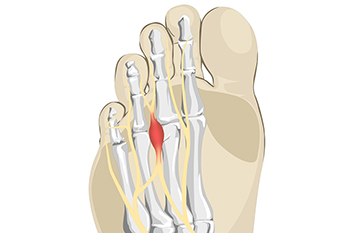6650 Frankford Ave
Philadelphia, PA 19135
 A podiatrist is a doctor that specializes in the treatment of foot conditions. There are many issues with the feet that can develop that a podiatrist should address. For example, if you have a wound or sore that won’t heal, a podiatrist should examine it, especially if you have diabetes. Any joint pain, pain with elevated legs, pain that increases with activity, or severe pain that lasts more than a day, can be from a variety of issues. Numbness, tingling or a burning can indicate neuropathy. Any discolorations in the feet or toes should be looked at as well because of the possibility of an infection. Lastly, if you are starting to run more often, a podiatrist can help identify potential problems and give advice to avoid them. If you have any other questions about issues regarding your feet, don’t hesitate to ask your podiatrist.
A podiatrist is a doctor that specializes in the treatment of foot conditions. There are many issues with the feet that can develop that a podiatrist should address. For example, if you have a wound or sore that won’t heal, a podiatrist should examine it, especially if you have diabetes. Any joint pain, pain with elevated legs, pain that increases with activity, or severe pain that lasts more than a day, can be from a variety of issues. Numbness, tingling or a burning can indicate neuropathy. Any discolorations in the feet or toes should be looked at as well because of the possibility of an infection. Lastly, if you are starting to run more often, a podiatrist can help identify potential problems and give advice to avoid them. If you have any other questions about issues regarding your feet, don’t hesitate to ask your podiatrist.
If you are dealing with pain in your feet and ankles, you may want to seek help from a podiatrist. Feel free to contact John M. Fanelly, DPM from Northeast Philadelphia. Our doctor can provide the care you need to keep you pain-free and on your feet.
What Is a Podiatrist?
A podiatrist is a doctor of podiatric medicine who diagnoses and treats conditions of the foot, ankle, and related structures of the leg. Your podiatrist may specialize in a certain field such as sports medicine, wound care, pediatrics, and diabetic care. Podiatrists have the ability to become board certified through training, clinical experience, and then taking an exam.
What Do Podiatrists Do?
On a daily basis, a podiatrist may perform the following activities:
It is very important that you take care of your feet. It’s easy to take having healthy feet for granted, however foot problems tend to be among the most common health conditions. Podiatrists can help diagnose and treat a variety of feet related conditions, so it is crucial that you visit one if you need assistance.
If you have any questions please feel free to contact our office located in Philadelphia, PA . We offer the newest diagnostic and treatment technologies for all your foot and ankle needs.
Morton's neurom a occurs when a nerve at the base of the toes on the bottom of the foot becomes inflamed. This occurs most often between the 3rd and 4th toes. Neuromas usually form when a nerve is continually pinched or irritated, causing it to enlarge and scar. This usually causes symptoms such as a numbing and tingling sensation or a burning and shooting sensation in the ball of the foot. A Morton’s neuroma may also feel like the toes have fallen asleep or like walking with a crumpled up sock or pebble in your shoe. Eventually, Morton's neuroma will lead to aggravated pain from pressure. Pain in the foot that persists may be a sign of Morton’s neuroma and should be looked at by a podiatrist for a proper diagnosis and treatment method.
a occurs when a nerve at the base of the toes on the bottom of the foot becomes inflamed. This occurs most often between the 3rd and 4th toes. Neuromas usually form when a nerve is continually pinched or irritated, causing it to enlarge and scar. This usually causes symptoms such as a numbing and tingling sensation or a burning and shooting sensation in the ball of the foot. A Morton’s neuroma may also feel like the toes have fallen asleep or like walking with a crumpled up sock or pebble in your shoe. Eventually, Morton's neuroma will lead to aggravated pain from pressure. Pain in the foot that persists may be a sign of Morton’s neuroma and should be looked at by a podiatrist for a proper diagnosis and treatment method.
Morton’s neuroma is a very uncomfortable condition to live with. If you think you have Morton’s neuroma, contact John M. Fanelly, DPM of Northeast Philadelphia. Our doctor will attend to all of your foot care needs and answer any of your related questions.
Morton’s Neuroma
Morton's neuroma is a painful foot condition that commonly affects the areas between the second and third or third and fourth toe, although other areas of the foot are also susceptible. Morton’s neuroma is caused by an inflamed nerve in the foot that is being squeezed and aggravated by surrounding bones.
What Increases the Chances of Having Morton’s Neuroma?
Morton’s neuroma is a very treatable condition. Orthotics and shoe inserts can often be used to alleviate the pain on the forefront of the feet. In more severe cases, corticosteroids can also be prescribed. In order to figure out the best treatment for your neuroma, it’s recommended to seek the care of a podiatrist who can diagnose your condition and provide different treatment options.
If you have any questions, please feel free to contact our office located in Philadelphia, PA . We offer the newest diagnostic and treatment technologies for all your foot care needs.
 Diabetic patients are often aware of the link between foot problems and how their diabetes is managed. Complications can include a numbing sensation or tingling in the feet which may be the beginning of diabetic neuropathy. It may cause the inability to feel existing cuts, wounds, or bruises. If these ailments are left untreated, a diabetic ulcer may form, which may lead to amputation. Additionally, foot muscles may be affected in severely diabetic patients, which may change the alignment of the foot. Proper foot care management can begin with monitoring the glucose levels in the blood. A daily practice of good foot hygiene can consist of washing and drying the feet thoroughly, and special footwear may need to be worn. If you have diabetes, it is strongly suggested that you are under the care of a podiatrist who can help you to properly manage this condition, in addition to providing you with proper foot care advice.
Diabetic patients are often aware of the link between foot problems and how their diabetes is managed. Complications can include a numbing sensation or tingling in the feet which may be the beginning of diabetic neuropathy. It may cause the inability to feel existing cuts, wounds, or bruises. If these ailments are left untreated, a diabetic ulcer may form, which may lead to amputation. Additionally, foot muscles may be affected in severely diabetic patients, which may change the alignment of the foot. Proper foot care management can begin with monitoring the glucose levels in the blood. A daily practice of good foot hygiene can consist of washing and drying the feet thoroughly, and special footwear may need to be worn. If you have diabetes, it is strongly suggested that you are under the care of a podiatrist who can help you to properly manage this condition, in addition to providing you with proper foot care advice.
Diabetic foot care is important in preventing foot ailments such as ulcers. If you are suffering from diabetes or have any other concerns about your feet, contact John M. Fanelly, DPM from Northeast Philadelphia. Our doctor can provide the care you need to keep you pain-free and on your feet.
Diabetic Foot Care
Diabetes affects millions of people every year. The condition can damage blood vessels in many parts of the body, especially the feet. Because of this, taking care of your feet is essential if you have diabetes, and having a podiatrist help monitor your foot health is highly recommended.
The Importance of Caring for Your Feet
Patients with diabetes should have their doctor monitor their blood levels, as blood sugar levels play such a huge role in diabetic care. Monitoring these levels on a regular basis is highly advised.
It is always best to inform your healthcare professional of any concerns you may have regarding your feet, especially for diabetic patients. Early treatment and routine foot examinations are keys to maintaining proper health, especially because severe complications can arise if proper treatment is not applied.
If you have any questions please feel free to contact our office located in Philadelphia, PA . We offer the newest diagnostic and treatment technologies for all your foot and ankle needs.
 There is a condition that is called sweaty sock syndrome, which is also known as juvenile plantar dermatosis. It affects the bottoms of the feet and the heels of young teenagers and children. The skin of the feet may become red, dry, tight, and scaly. Relief may be found by wearing shoes that are made of breathable materials. It can also help to apply moisturizer to the feet at night. Existing medical conditions such as eczema may lead to sweaty sock syndrome. If your child has symptoms of this condition, it is suggested that you speak with a podiatrist who can determine what the best course of treatment is for your child.
There is a condition that is called sweaty sock syndrome, which is also known as juvenile plantar dermatosis. It affects the bottoms of the feet and the heels of young teenagers and children. The skin of the feet may become red, dry, tight, and scaly. Relief may be found by wearing shoes that are made of breathable materials. It can also help to apply moisturizer to the feet at night. Existing medical conditions such as eczema may lead to sweaty sock syndrome. If your child has symptoms of this condition, it is suggested that you speak with a podiatrist who can determine what the best course of treatment is for your child.
The health of a child’s feet is vital to their overall well-being. If you have any questions regarding foot health, contact John M. Fanelly, DPM of Northeast Philadelphia. Our doctor can provide the care you need to keep you pain-free and on your feet.
Tips for Keeping Children's Feet Healthy
If you have any questions, please feel free to contact our office located in Philadelphia, PA . We offer the newest diagnostic and treatment technologies for all your foot care needs.